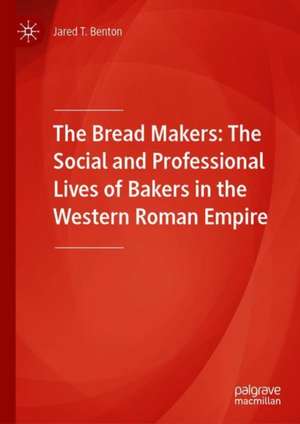The Bread Makers: The Social and Professional Lives of Bakers in the Western Roman Empire
Autor Jared T. Bentonen Limba Engleză Hardback – 15 dec 2020
| Toate formatele și edițiile | Preț | Express |
|---|---|---|
| Paperback (1) | 692.88 lei 43-57 zile | |
| Springer International Publishing – 15 dec 2021 | 692.88 lei 43-57 zile | |
| Hardback (1) | 698.30 lei 43-57 zile | |
| Springer International Publishing – 15 dec 2020 | 698.30 lei 43-57 zile |
Preț: 698.30 lei
Preț vechi: 821.53 lei
-15% Nou
Puncte Express: 1047
Preț estimativ în valută:
133.62€ • 139.88$ • 110.56£
133.62€ • 139.88$ • 110.56£
Carte tipărită la comandă
Livrare economică 07-21 aprilie
Preluare comenzi: 021 569.72.76
Specificații
ISBN-13: 9783030466039
ISBN-10: 3030466035
Pagini: 199
Ilustrații: XIII, 216 p. 47 illus.
Dimensiuni: 148 x 210 mm
Greutate: 0.46 kg
Ediția:1st ed. 2020
Editura: Springer International Publishing
Colecția Palgrave Macmillan
Locul publicării:Cham, Switzerland
ISBN-10: 3030466035
Pagini: 199
Ilustrații: XIII, 216 p. 47 illus.
Dimensiuni: 148 x 210 mm
Greutate: 0.46 kg
Ediția:1st ed. 2020
Editura: Springer International Publishing
Colecția Palgrave Macmillan
Locul publicării:Cham, Switzerland
Cuprins
1. Introduction: Chaînes Opératoires and the Making of Roman Bread.- 2. Baking as Cultural Heritage: Regional Variation in the Roman Production of Bread.- 3. Modes of Production: Bakeries as Factories and Workshops.- 4 Experiencing the Bakery: Training, Status, Labor, and Exploitation.- 5. Voluntary Associations and Collectivity: A View from the East and the West.- 6. Crafting an Image.- 7. Conclusion: The Question of the Roman Middle Class.
Notă biografică
Jared T. Benton is Assistant Professor of Ancient Art and Archaeology at Old Dominion University, USA. He has excavated in Italy, Greece, Spain, and Morocco. Since 2013, Benton has been a area supervisor for the Contrada Agnese Project, part of the American Excavations at Morgantina. Since 2017, he has been director of the Urban Economy of Volubilis Project.
Textul de pe ultima copertă
Bread was the staple of the ancient Mediterranean diet. It was present in the meals of emperors and on the tables of the poorest households. In many instances, a loaf of bread probably constituted an entire meal. As such, bread was both something that unified society and a milieu through which social and ethnic divisions played out. Similarly, bakers were not a monolithic demographic. They served both the rich and the poor, but some bakers clearly operated within regional traditions. Some lived in big cities and others lived in small towns. Some bakers made flat breads and others made leavened loaves. Some made coarse brown loaves and others specialized in fancier white breads. This book offers new methods and new ways of framing bread production in the Roman world to reveal the nuances of an industry that fed an empire. Inscriptions, Roman law, and material remains of Roman-period bakeries are combined to expose the cultural context of bread making, the economic context of commercialbaking, the social hierarchy within the workforces of bakeries, and the socio-economic strategies of Roman bakers.
Caracteristici
Reveals the rich diversity of bread making in the Roman world. Offers new methods and frameworks for understanding ancient production. Moves past questions of production to address the economic strategies and social habits of bakers. Inperprets iconography and depictions of bread making as expressions of ideology and visual constructions of identity rather than as documentations of production
